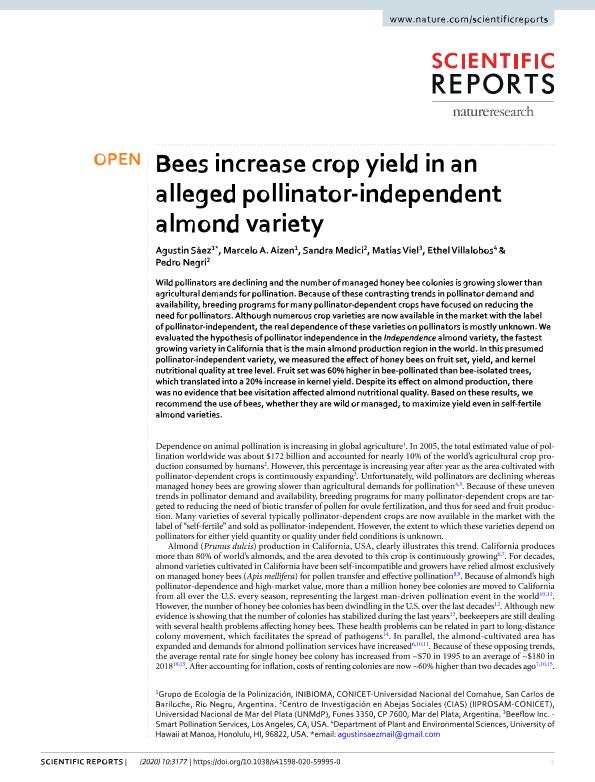Artículo
Bees increase crop yield in an alleged pollinator-independent almond variety
Sáez, Agustín ; Aizen, Marcelo Adrian
; Aizen, Marcelo Adrian ; Medici, Sandra Karina
; Medici, Sandra Karina ; Viel, Matias; Villalobos, Ethel; Negri, Pedro
; Viel, Matias; Villalobos, Ethel; Negri, Pedro
 ; Aizen, Marcelo Adrian
; Aizen, Marcelo Adrian ; Medici, Sandra Karina
; Medici, Sandra Karina ; Viel, Matias; Villalobos, Ethel; Negri, Pedro
; Viel, Matias; Villalobos, Ethel; Negri, Pedro
Fecha de publicación:
02/2020
Editorial:
Nature Publishing Group
Revista:
Scientific Reports
e-ISSN:
2045-2322
Idioma:
Inglés
Tipo de recurso:
Artículo publicado
Clasificación temática:
Resumen
Wild pollinators are declining and the number of managed honey bee colonies is growing slower than agricultural demands for pollination. Because of these contrasting trends in pollinator demand and availability, breeding programs for many pollinator-dependent crops have focused on reducing the need for pollinators. Although numerous crop varieties are now available in the market with the label of pollinator-independent, the real dependence of these varieties on pollinators is mostly unknown. We evaluated the hypothesis of pollinator independence in the Independence almond variety, the fastest growing variety in California that is the main almond production region in the world. In this presumed pollinator-independent variety, we measured the effect of honey bees on fruit set, yield, and kernel nutritional quality at tree level. Fruit set was 60% higher in bee-pollinated than bee-isolated trees, which translated into a 20% increase in kernel yield. Despite its effect on almond production, there was no evidence that bee visitation affected almond nutritional quality. Based on these results, we recommend the use of bees, whether they are wild or managed, to maximize yield even in self-fertile almond varieties.
Palabras clave:
HONEYBEE
,
POLLINATION
,
CROP YIELD
,
BIODIVERSITY
Archivos asociados
Licencia
Identificadores
Colecciones
Articulos(CCT - MAR DEL PLATA)
Articulos de CTRO.CIENTIFICO TECNOL.CONICET - MAR DEL PLATA
Articulos de CTRO.CIENTIFICO TECNOL.CONICET - MAR DEL PLATA
Articulos(INIBIOMA)
Articulos de INST. DE INVEST.EN BIODIVERSIDAD Y MEDIOAMBIENTE
Articulos de INST. DE INVEST.EN BIODIVERSIDAD Y MEDIOAMBIENTE
Citación
Sáez, Agustín; Aizen, Marcelo Adrian; Medici, Sandra Karina; Viel, Matias; Villalobos, Ethel; et al.; Bees increase crop yield in an alleged pollinator-independent almond variety; Nature Publishing Group; Scientific Reports; 10; 1; 2-2020; 1-7
Compartir
Altmétricas



